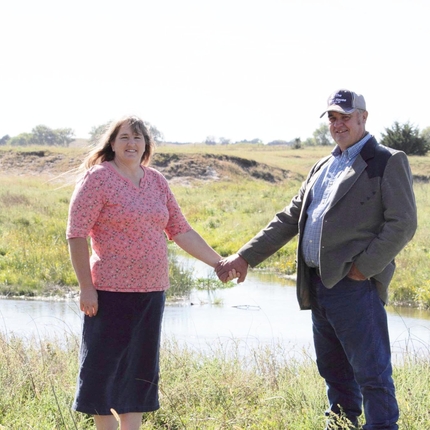To learn more, check out Conservation Innovation Grants Farmer Case Study: Bob Bernt. Cora Fox contributed to this blog.
Clear Creek Organic Farm, in Spalding, Nebraska, hosts more than crops and livestock.
The Bernt family has run the operation for more than 125 years and in that time, it has grown to not only include the traditional elements of a farm, but now also hosts recreational events, such as a recent concert benefiting Nebraska flood victims, and a tanking business along the Cedar River.
Bob Bernt runs the 700-acre operation with his wife and children. Their livestock, including 50 head of Jersey cattle, hogs, and poultry, are all pastured and grass fed. Vegetable crops utilize 12 acres plus greenhouses. Bob also produces organic cheese, butter, and ice cream at their on-farm facility. The family has their own meat processing facility as well, and a certified kitchen to process vegetables.
“We have always farmed with an organic mindset,” said Bob. “We believe the health of the soil affects the health of everything and everyone that eats from it. Our farm motto is ‘Producing healthy foods for healthy families.’ So, the understanding of soil health has been very important for us.”
Though Bob doesn’t have any formal education in agriculture, he grew up loving the land, and farmed alongside his dad. He started farming in the 1970s, and over the years has found that one of the most important keys to success has been to be around others who share the same mindset.
“Formal education in agriculture isn’t necessary—it’s actually a detriment,” said Bob. “It’s more important to have an open mind. I learned from the ‘school of hard knocks,’ and from my parents, who I greatly valued as my teachers. It’s important to surround yourself with folks who do what you want to accomplish.”
Throughout his experiences, Bob has found that utilizing conservation practices makes for a better operation.
Starting in the 1970s, he used cover crops and crop rotations, first with a soybean, rye, corn rotation. He also tries to farm as close to a closed-loop system as possible. Bob’s livestock mob graze annuals and perennials in small paddocks, and he runs his hogs, cattle, and poultry together.
“Conservation is very important to me and my family—it’s our way of life,” said Bob. “Successful crops start with healthy soil and water. And, animal impacts on the soil are incredibly helpful in rebuilding organic matter in the topsoil.”
He believes more farmers should focus on rebuilding the soil, but to make that happen, they will have to change their perspective on agriculture.
“Sequestering carbon is important, and we need to take action now to prevent further issues down the road.” Bob said.
Over the years, he has discovered his customers care about the quality of their food. They like to know how the land is treated and how the livestock are taken care of.
Going that extra mile has paid off for Bob and his family. The operation has grown due to their emphasis on value-added production, and they have been able to support themselves without expanding the physical size of the farm.
“My wife, Kristine, and I have been blessed with 12 beautiful children, and they all play a part in the production,” said Bob. “We try our best to work together and help out wherever needed. There is nothing more pleasing for parents to see than this to happen among their children.”
And, for Bob, that’s what it’s all about—taking care of the land he loves with the help of the people most important to him.
“Surround yourself with successful, uplifting people,” he said. “Farming is a challenge—it’s hard to do on your own. It can be discouraging—you might lose a crop, or some livestock—but it’s important to be resilient and stay positive.”





